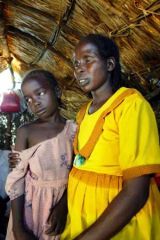Rapes, forced moves continue in Darfur, UN says
GENEVA, Dec 3 (Reuters) – Arab Janjaweed militia continued to rape women and girls in Sudan’s Darfur region last month while authorities forcibly moved refugees, says the United Nations.

|
|
A displaced Sudanese pregnant mother embraces her daughter at Kalma camp near Nyala south Darfur October 7, 2004. The mother said she was a victim of rape by Janjaweed, Arab militia members. (Reuters) |
The information was collected from refugees by 16 U.N. human rights monitors deployed in the three Darfur states.
“They are reporting that sexual violence and rape continue to be reported in all three of the regions of Darfur,” U.N. human rights spokesman Jose Luis Diaz told a news briefing on Friday.
“Every case is taken up with authorities,” he added.
The rapes had contributed to a huge sense of insecurity among many of the 1.6 million internally-displaced persons (IDPs) driven from their homes since the violence began in 2003.
“Women and girls are afraid to leave the camps,” Diaz said.
There was also an escalation during November in forced relocations in South Darfur, notably from camps of Al Jeer and Otash, near the capital Nyala, according to the U.N. spokesman.
“IDPs also throughout the region continue to fear and distrust the police. There is widespread impunity which is continuing with reports of police still refusing to record complaints,” Diaz said.
After years of skirmishes between Arab nomads and mostly non-Arab farmers over scarce resources in arid Darfur, rebels took up arms early last year accusing the government of neglect and of arming Arab militia, known as Janjaweed, to loot and burn non-Arab villages.
Khartoum admits arming some militias to fight the rebels but denies any links to the Janjaweed, calling them outlaws.
It said early last month it had not violated any international law or agreements by moving camps for people who fled their homes, and did not rule out repeating the move.
The violence in Darfur has created what the United Nations says is one of the world’s worst humanitarian crises.
Recent fighting had put civilians at risk in Masteri, south of West Darfur’s capital El Geneina, which rebel groups attacked, drawing retaliation by government forces who sent 18 mortars into the village, Diaz said.
“There have also been reports during the period of cases of abduction of civilians by the rebel Sudan Liberation Army (SLA) in West Darfur … ,” he said. “The situation is very complex and continues to deteriorate.”
The number of U.N. human rights monitors is set to double shortly to 32, but they remain basically helpless to halt violations in Darfur, where about 1,000 African Union ceasefire monitors are also deployed.
“There is very little they (U.N. monitors) can do to prevent it while it is happening. Forced relocations are usually undertaken by police and law enforcement officials,” Diaz said.
